|
|
|
Sort Order |
|
|
|
Items / Page
|
|
|
|
|
|
|
| Srl | Item |
| 1 |
ID:
116068
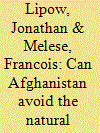

|
|
|
|
|
| Publication |
2012.
|
| Summary/Abstract |
Recent discoveries of significant mineral deposits offer Afghanistan the opportunity to attain a level of economic development sufficient to stabilize that country's volatile security situation while providing Afghans with a reasonable standard of living. Much, however, depends on whether Afghanistan can avoid the "Natural Resource Curse," an inter-related set of economic and social pathologies that often bedevil resource-endowed countries. In this article, the authors describe the Natural Resource Curse, evaluate the obstacles it raises for Afghan economic development, and offer a strategy to minimize the risks Afghanistan faces in its efforts to exploit its mineral wealth for the benefit of the population.
|
|
|
|
|
|
|
|
|
|
|
|
|
|
|
|
| 2 |
ID:
171484
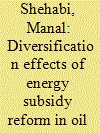

|
|
|
|
|
| Summary/Abstract |
For oil exporters, energy subsidy reform and economic diversification are critical policy responses to recent fundamental changes in the global oil market and oil price declines, yet the relationship between them is little understood. This article investigates linkages between energy subsidy reform and accelerating economic diversification away from hydrocarbons in a low oil price environment, using illustrations from Kuwait. It employs an economy-wide, general equilibrium model with oligopolistic industrial structure, the first of its kind for an economy in the Middle East and North Africa, that embodies unique elements of the country's economic structure—oil dependence; public sector dominance; subsidies; sovereign wealth funds; industrial collusive pricing behaviour; and guest workers. The article argues that, contrary to common popular discourse, Kuwait's economy has a diversified economic base, but this base fails to diversify export or government revenue needed for economic sustainability. Results show that weak economic diversification in oil exporters with a similar economic structure is not primarily due to “Dutch disease,” as dominant in the literature, but to economic constraints and distortions that impair structural change and exacerbate overdependence on hydrocarbons. Labour and competition reforms relax some constraints, achieving large efficiency gains that extend economy-wide and can expand non-energy tradable sectors. The analysis has important policy implications. First, the potential role of pricing regulation in small economies in moderating economic impacts of negative oil shocks. Second, in oil economies characterized by pervasive oligopolies, microeconomic reform can be a channel to achieve efficiency and better diversification effects of subsidy reform.
|
|
|
|
|
|
|
|
|
|
|
|
|
|
|
|
| 3 |
ID:
100196
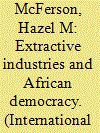

|
|
|
|
|
| Publication |
2010.
|
| Summary/Abstract |
y the well-known "resource curse," the abundance of oil and other valuable minerals has been associated with patrimonialism and repression-in Africa and elsewhere. This article demonstrates a self-sustaining dynamic: lack of accountability enables elite appropriation of resources which in turn raises the monetary value of political control and finances continued repression. Several initiatives have been taken in recent years to foster transparency in mineral production and revenue, but with marginal impact. Lifting the curse requires a robust global effort to discourage "plunder oil." This is unlikely as long as the benefits of cheap oil to the importing countries outweigh the costs to the population of the exporting countries. The oil addiction of developed and emerging economies remains an oil malediction for African democracy. But launching a sustained international debate could eventually bear fruit.
|
|
|
|
|
|
|
|
|
|
|
|
|
|
|
|
| 4 |
ID:
174992
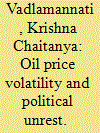

|
|
|
|
|
| Summary/Abstract |
Revenue from oil makes countries susceptible to the “resource curse” since rulers have ready access to finance for buying off opposition rather than reform. We explore this issue by examining whether oil price volatility affects anti-government unrest. We argue that in oil-producing countries, low price years generate anti-government protest conditional on a state's access to foreign exchange reserves. The prudent management of oil revenue during boom years can allow some oil-rich states to manage political dissent while others fail. Contrarily, in oil-importing countries, high oil price years increase anti-government dissent, but again, conditional on access to foreign exchange reserves, which allow governments to ease the pain of austerity. Using panel data covering 165 countries between 1980 and 2013 (34 years), we find clear evidence in support of these propositions. Oil-producer countries that are able to resist political Dutch disease and save for “rainy days” are more capable of weathering low-price years. Similarly, oil import-dependent states face higher dissent during high oil price years, but conditional on access to foreign reserves. These results are in line with others that show that some oil producers avoid civil war through heavy public spending. Oil-rich countries should manage oil revenues in ways that allow them to survive the low price years, perhaps by avoiding both economic and political Dutch disease, which will only lead to inevitable regime challenge. The results are robust to alternative data, measurement, sample size, and estimation methods.
|
|
|
|
|
|
|
|
|
|
|
|
|
|
|
|
| 5 |
ID:
151277
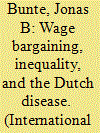

|
|
|
|
|
| Summary/Abstract |
The theory of the “Dutch Disease” predicts that income from oil and other natural resources produces negative economic consequences through two different mechanisms. The “Resource Movement Effect” suggests that workers leave manufacturing for higher-paying jobs in other sectors. The “Spending Effect” implies that spending resource wealth domestically leads to exchange rate appreciation. The combination of these processes results in the contraction of the export sector. This article explores how, and why, a country’s institutions may prevent the Dutch Disease before it starts. Incorporating insights from the “Varieties of Capitalism” literature, I find that the Dutch Disease is significantly less severe in countries with a high degree of wage bargaining coordination and with low income inequality. The former interrupts the Resource Movement Effect as it limits workers’ incentives to move out of the tradable sector. The latter moderates the Spending Effect because it prevents appreciation of the real exchange rate.
|
|
|
|
|
|
|
|
|
|
|
|
|
|
|
|
|
|
|
|
|